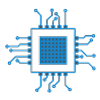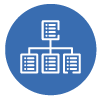Fast, Robust, Accurate
SEMulator3D’s process-predictive capabilities benefit all participants in the semiconductor supply chain, from techonology developers to fabless IP providers to equipment and process vendors.

Predictive Process Modeling
Predicts complex interactions between designs and integrated process flows. Identify process problems prior to fabrication.

Perform Variation Experiments
Efficiently develop process flows and perform automated virtual experiments not feasible in the actual fab

Flexible and Robust
Flexible for multiple use cases & applicable to any process and any layout, regardless of complexity or technology.

Valuable at Every Stage
Leverage virtual fabrication at every stage of technology development. Decrease costly, time-consuming silicon learning cycles
Software Capability Highlights

Core Process Modeling
Using unique physics-driven 3D modeling technology, the SEMulator3D modeling engine can model a wide variety of unit process steps. Each process step requires only a few geometric and physical input parameters that are easy to understand and calibrate. Just as in an actual fab, upstream unit process parameters (such as deposition conformality, etch anisotropy, selectivity, etc.) interact with each other and design data in a complex way to impact the final device structure.

Advanced Process Modeling
To correctly predict the end result of a complete process flow, each process step must be modeled accurately. SEMulator3D Advanced Process Modeling adds additional process steps to the standard library, such as MultiEtch and Selective Epitaxy. These steps provide more accurate modeling of plasma (dry) etching, selective epitaxial growth, and more.

Automation
SEMulator3D Automation is a spreadsheet-driven automation engine that enables massively parallel process variation studies. By automatically building a series of SEMulator3D models with specific variations in process parameters, SEMulator3D Automation enables virtual studies of process tolerances, yield or cross-wafer uniformity.

Analytics
The SEMulator3D Analytics module automates statistical analysis of process variation directly within SEMulator3D. The new Analytics user interface guides users in the design, execution and analysis of large statistical experiments using various techniques, including Monte-Carlo process variation. Automated multivariate regression is used to identify important parameters and rank them by their impact on process variation.

Automation
SEMulator3D Automation is a spreadsheet-driven automation engine that enables massively parallel process variation studies. By automatically building a series of SEMulator3D models with specific variations in process parameters, SEMulator3D Automation enables virtual studies of process tolerances, yield or cross-wafer uniformity.

Analytics
The SEMulator3D Analytics module automates statistical analysis of process variation directly within SEMulator3D. The new Analytics user interface guides users in the design, execution and analysis of large statistical experiments using various techniques, including Monte-Carlo process variation. Automated multivariate regression is used to identify important parameters and rank them by their impact on process variation.

Device Analysis
The Device Analysis feature, as part of the Electrical Analysis module, can extract electrical characteristics of a transistor, and explore transistor process variability on device performance, all directly within SEMulator3D.

Electrical Analysis
The Electrical Analysis module adds powerful resistance and capacitance extraction to deepen the understanding of process and design sensitivities. The Electrical Analysis module can calculate the resistance of conductor nets and capacitance of nets directly within SEMulator3D, providing a single platform for both 3D modeling and validation of electrical function.

Visualization
SEMulator3D Viewer shows a 3D rendering of the virtual device model at every step in the process. Step-by-step visualization can aid in understanding process failure modes and other complex process phenomena. Cross-sectioning and dimensional measurements can be performed anywhere on the 3D model. SEMulator3D Viewer has many advanced capabilities, including automatic animation of process steps and automatic export to Microsoft PowerPoint.

And Much More...
- Mesh generation for export to standard mesh formats
- A full suite of layout viewing and editing tools
- Customization via a full Python scripting API
- A library of new process modeling capabilities, written in Python
- Example process technology files
The CoventorMP platform provides a unified environment for MEMS design, starting from fully parametric design entry to the production of functional models that can be simulated at all levels of abstraction. For over two decades, Coventor has supplied world-leading MEMS companies and R&D organizations with simulation tools that accurately predict the complex, multi-physics behavior of MEMS devices. Our on-going focus has resulted in MEMS-specific capabilities and simulation expertise that helps our customers significantly reduce time to market.

Design, Optimize, Integrate
CoventorMP combines the complementary strengths of Coventor’s industry-leading software tools for MEMS design, CoventorWare and MEMS+, into a single powerful environment for MEMS design automation. The software platform is designed to facilitate detailed, highly accurate modeling when required while simultaneously permitting performance-improving compact or reduced-order modeling when applicable. In essence, designs entered in CoventorMP can serve as a single “golden master” for all types of modeling, eliminating the need for time consuming and error-prone manual transfer between different modeling environments.

Parametric Design Entry
Capable of accommodating most layout-based or component-based design methodologies

Rapid Design & Integration
Construct highly efficient compact finite element models with MEMS+ using MEMS-specific building blocks

Detailed Device Analysis
Utilize a suite of field solvers in CoventorWare for modeling and simulating a wide range of MEMS devices

MEMS Process Design Kits (PDK)
Create “first time right” designs for a proven MEMS technology with Coventor’s MEMS PDK development services
A Complete Platform for MEMS Design Automation
MEMS+ and CoventorWare work seamlessly together in the CoventorMP framework. They provide a design platform that enables MEMS designers to simulate critical end-product performance specs such as sensitivity, linearity, frequency response, signal-to-noise ratio, temperature stability or actuation time. Both products are useful in all phases of a typical MEMS development program. These software tools are ideal for MEMS devices that employ mechanical, electrostatic, piezo-electric, piezo-resistive, or thermal effects for sensing or actuation.

- Fully Parametric Design Entry
- Fast Concept Exploration and Design Optimization
- System-Level Modeling & Circuit Modeling
CoventorWare
Design Details, Verify Compact Models, and Extract Lumped Parameters

CoventorWare is a suite of field solvers integrated with pre- and post-processing tools. The suite has many MEMS-specific features that make it the preferred choice over general-purpose finite element tools for simulating MEMS and other micro-fabricated devices.
- Preprocessing and Meshing Optimized for MEMS
- World-Class Coupled Electro-Mechanics
- Special MEMS Physics Simulation
Link – www.coventor.com
